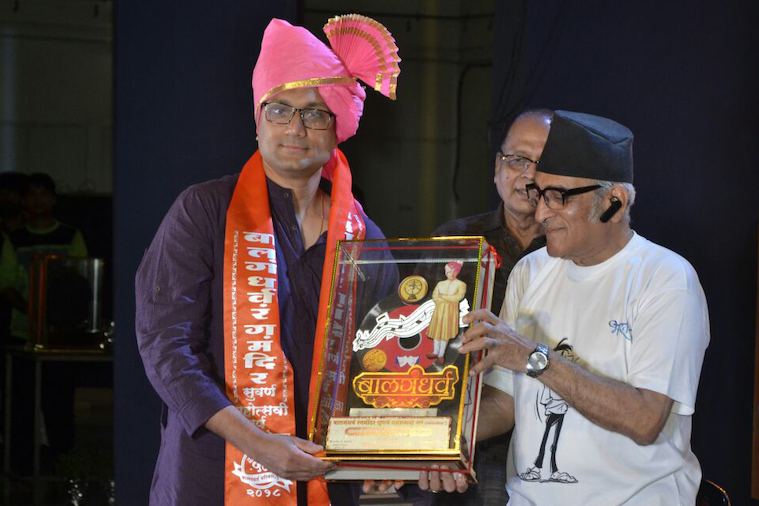September 18, 2018
Great things can come to a person when they least expect it. Such was the case this summer, when Senior Teaching Specialist Amol Pavangadkarreceived the prestigious Balgandharva Parivar Award while on a study abroad trip in India. Recipients are nominated by a committee based on their outstanding and continuous service to theatre, film, media arts and community.
“Six people had nominated me, and I was not aware of it. When I got the call, I changed my teaching arrangements for that half a day in Hyderabad and booked a last-minute plane ticket to Pune,” said Pavangadkar, who teaches in the Department of Media & Information. “I was expecting maybe 50 to 60 people [at the event], but there were more than 1,000 people there. It was a really elaborate ceremony.”
Filmmaking across Cultures
Pavangadkar’s journey through media and filmmaking came full circle when he accepted the award in his hometown of Pune, India. He first started working on production sets in 1996 as a student in Pune, and eventually made his way to the United States to earn a master’s degree in telecommunication at Michigan State University in 2002.
“When I was working in Bollywood, I mostly made feature films and television series in multiple languages. It got boring because there was kind of a template in India and I wanted to do more, which is why I moved to the U.S.,” said Pavangadkar. “At MSU, I teach film and video production and work closely with students on a lot of diverse and experimental projects.”
One of those projects was the student-made short film “Anya’s Green Card,” which premiered in November 2017 and was screened at the 2018 Traverse City Film Festival. In lieu of leading his usual trip to India, Pavangadkar used the production as an opportunity to bring Bollywood to East Lansing.
Home Sweet Home
While in India this summer, Pavangadkar and his students produced a Bollywood-style short film and a Bollywood dance video. A behind-the-scenes documentary about the making of the dance video is currently in production.
“I try to improve the cultural understanding of India in the U.S., and vice versa, by taking American students to India on study abroad,” said Pavangadkar. “I’ve been teaching at MSU for close to 16 years now. I learn a lot from the students and how they respond to my teaching. Every day is a good learning experience.”
Pavangadkar’s contributions to teaching and filmmaking are just one example of how he has left his mark on the media arts. Within the United States, Pavangadkar has successfully led production teams to improve outreach media and tools for violence reduction, drug market interventions, anti-counterfeiting efforts, improving nutrition in low-income families and mercury poisoning awareness, among others.
His impact also extends beyond the U.S. and India to the continent of Africa, where he worked on a project funded by the United States Agency for International Development to improve farming in low-income communities. Through the Global Center for Food Systems Innovation at MSU, Pavangadkar led the project’s media team to help train local journalists, scientists, community leaders and government officials on communication and storytelling in agriculture.
With a glowing track record in global communication and community projects, it is easy to see why Pavangadkar was chosen for the Balgandharva Parivar Award.
“In addition to the unexpectedness of the award, the highlight for me was receiving it in my hometown,” said Pavangadkar. “I was among friends and family that I haven’t seen together for about 17 years now, so accepting the award in their presence from the actors and the personalities I looked up to was the most compelling part.”
By Kristina Pierson
